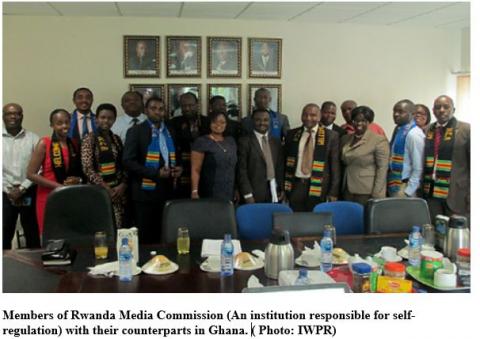Hard-hitting laws stifling Rwanda Media Freedom
 Submitted by jbimokola on
Submitted by jbimokola on

Full multimedia story on https://ntaleashiraf.wordpress.com/2018/06/20/hard-hitting-laws-silence-rwanda-media-freedom
Restrictive media laws in Rwanda remain a major roadblock to press freedom in the country, despite a reported improvement in the Press Freedom Index in 2018. Journalists and human rights bodies say the country could do a lot better if the laws were made better.
Ashraf Ntale looks at the major laws and their impact on press freedom, as well as efforts made to change the legal framework.
Media freedom in Rwanda remains restricted, despite assurances by government officials of their commitment to review them. Journalists risk arrest under a variety of restrictive laws, and can face long jail terms if convicted.
Different press laws have been put in place under president Paul Kagame with a view that journalists can write whatever they choose as long as it is not divisionist and does not promote genocide ideology, and that such information shall not prejudice public order.
The 2002 divisionist law imposed specific restrictions on Journalists with a stipulation that Journalists have to reveal their sources to government on demand; targeting publications like Umeseso. In 2004, Charles Kabonero, the Chief Editor was charged with defamation after refusing to reveal the source of the article accusing the vice-president of the lower house of corruption and planning to run against Kagame.
The weekly Kinyarwanda-language newspaper Umuco closed in 2008 after its founder and editor, Bonaventure Bizumuremyi fled the country to avoid persecution stemming from a March opinion piece critical of President Paul Kagame.
The 2013 media law presents a number of positive elements including recognition of self-regulation under Article 4 of the self-regulatory body for journalists. It was meant to set up journalistic professional standards. Article 15 empowers the same body to deal with violations of journalists’ rights. These rights include the right to collect information; respect for the confidentiality of journalistic sources; and the right to call on any resourceful person to provide information, among others.
Article 19 notes that the above law fails to meet international standards on a number of issues, one being that the state retains control of the internet. This threatens media pluralism and the free flow of information, the confidentiality of journalistic sources is not adequately protected. According to the law, courts can require journalists to reveal their sources in any legal proceedings, rather than in only the most serious of criminal cases. The law does not require courts to establish that there is no other reasonable alternative means available for obtaining that information before ordering the disclosure of a source.
A new ICT law passed in June 2016 created a comprehensive legal and regulatory framework for the ICT sector and codified prohibitions on the dissemination of “grossly offensive” or “indecent” messages as well as the use of ICTs to cause “annoyance, inconvenience, or needless anxiety.”
According to Henry Maina, Executive Director at Article 19 East Africa, Rwanda still has a bad image on issues concerning freedom of expression with a number of media regulators recognised by law.
“The state of media freedom in Rwanda is not free whereby even the self-regulated - Rwanda Media Council (RMC) established at the beginning of 2013 to protect journalists has suffered government censorship on many occasions,” Maina said.
According to Freedom House, government censorship of internet content has increased in recent years. Three BBC websites were blocked in October 2014 in response to the BBC’s broadcast of the controversial documentary, “Rwanda, The Untold Story”. The Ireme news website was blocked in December 2015, joining a number of other independent online media outlets. Authorities told online news editors to withhold or delete content on sensitive topics, such as the December 2015 constitutional referendum to extend presidential term limits. The Press index statistics of 2018 on freedom of expression ranked Rwanda at 156th position in a list of 180 states, with North Korea at the bottom.
- Log in to post comments
- 842 reads
